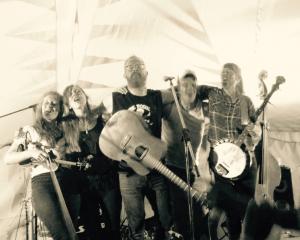
Robert Fisher lives in the foothills of the Sierra Nevada range, in the desert.
Depending on traffic, it can take him anywhere from one to two hours to travel from his home to Los Angeles, a place he describes as "not your normal kind of place".
The hub of the Willard Grant Conspiracy, a United States-based ensemble that mixes folk, country and other quirky, sometimes dark, flavours, Fisher lives near the stomping ground of Captain Beefheart and Beefheart's old mate, Frank Zappa.
And though Fisher's music may not be like that of his neighbours, it benefits from a similarly collaborative process.
Fisher describes his household as something of a menagerie - at last count he had six cats and a couple of dogs - and his band is also a sizeable collection.
Formed in 1995 by Fisher and Paul Austin, who had played in many bands from 1982 and developed a writing partnership that lasted until 2001, Willard Grant Conspiracy has a loose configuration, comprising musicians from Massachusetts, Arizona, New York, London, Holland and Japan.
The current roster features about 30 members.
A live show may be as diverse as Fisher playing solo or having as many as 14 members on stage at one time.
Instruments include acoustic guitar, mandolin, pump organ, violin, cello, viola, piano, trumpet, drums, bass, accordion, electric guitar and lap steel guitar.
For his forthcoming New Zealand tour, which includes a performance at Sammy's, Dunedin, on Thursday, October 2, Fisher will be going it alone, his baritone accompanied by acoustic guitar.
There had been talk of him working with some local musicians but as of last week, during a telephone interview, he thought it might be best to keep things simple.
"I have to be careful as to what level of involvement I invite . . . As much as I prefer playing with other people, on the other hand I also want it to be good."
The line-up for Willard Grant Conspiracy's latest, seventh, album, Pilgrim Road, features no fewer than 18 musicians.
Some have been with him for more than a decade, others are more recent arrivals.
Significantly, all are slaves to the song, Fisher says, adding the key is to let the tracks take their own course.
"People play with each other and don't find it unusual to do so. I think rock 'n' roll, indie rock, whatever you want to call it, is the only place where people insist on this Three Musketeers notion of a band.
"I think that is something you can support if you're young enough, but I think once people start to develop a life outside of the band it becomes an unsupportable construct. This one makes a lot more sense."
On Pilgrim Road, the songs travel to some melancholic yet sonically delightful places, a result of a song-writing collaboration (there's that word again) between Fisher and Glasgow-based composer Malcolm Lindsay.
"We met about six years ago, at a show in Glasgow," Fisher explains.
"Because he is a film composer he has access to an incredible array of sounds, so we actually recorded and arranged the entire record between the two of us.
"I don't play any acoustic guitar on this record because there are other people who play it better than I do, so I let them do it."
Band members eventually replaced the sampled sounds with real instruments and added "bits of themselves to it", with the album taking a year to complete.
Fisher is happy with the result, despite the album dealing in subjects that are sometimes far from jovial.
"Take The Pugilist, about a person coming to terms with the notion of a soul that is broken. That is not an easy thing to write about, sing about or listen to," Fisher concedes.
"Painter Blue is a beautiful arrangement, but it is essentially about suicide."
Fisher, whose music has been compared to other dark dabblers such as Nick Cave, Leonard Cohen and the Tindersticks (mainly, perhaps, because all have baritone voices), believes melancholy is a misunderstood mood.
"There seems to have been a time, not only in music but in popular culture, when melancholy stopped being considered a viable area to mine.
"I know it didn't happen in the '50s, '60s or '70s, because if you look at popular culture - movies, books, music etc - it is full of melancholy.
"Maybe it was the 'me generation' that made it that less of an acceptable thing . . . So many of the great things in the history of art are about these kinds of subjects.
"These are the elemental things in life. You cannot look at Michelangelo's David without a sense of melancholy. I'm not comparing myself to Michelangelo, but . . . it's a lovely state of mind.
"It's sweet and reflective."
Fisher has a big voice. He also has a big body. He describes his weight as a symptom of wider issues, of "not healthy thinking".
A recovering drug addict and alcoholic, he regards his music as therapy and himself as a work in progress.
"I've been a creative person all my life, including when I was drinking and abusing drugs, but I think when I got clean the focus changed a little bit. I started to see my work as an important element in my recovery.
There is a certain search for the truth going on. It's not so much confessional; it's about the universal truths that connect all of us," he pauses, confessing that may sound a bit pompous.
"It's much more in the gut than that . . . Just getting sober doesn't mean you're well. It's the kind of self-destructiveness that is born out of personality and experience. You fight against it but there is a kernel that is always going to be there."
Thus Fisher keeps himself busy.
When he's not performing, writing or recording, he holds down a contract job in insurance.
He returns home on October 8; 10 days later he heads to the United States East Coast for a series of shows; then he's off to Berlin to rehearse for a major European tour in November-December.
"Somewhere in there, I'm going to try and write and record an album with my viola player, David Michael Curry. I have a bunch of stuff going on."
Though Fisher hates disclosing his age (he is 51) as much as the alt-country tag that dogs his band and "makes half the people run out of the room", he follows up with something of a verbal shrug: "It's not that bad. I probably do more than most 18-year-olds."
Many years ago, while a budding teen poet in California, he was advised by a teacher to "write about what you know".
It's a rule he continues to follow.
"People can tell when you are writing about something you don't know. I'm a firm believer in looking at things you don't want to look at. There is power in being able to lift the rock and seeing what's there.
"I'm convinced that you don't gain anything by avoiding what you will ultimately need to face. That informs a great deal of what I choose to write about.
"For me, the music comes first. This band comes out of the DIY aesthetic of punk.
"It's a funny thing, but a lot of the music business relies on attracting people to it who are in love with things that have nothing to do with music.
"When I hear someone who has been playing a while and who is bitter and unhappy, it's usually because they've fallen in love with the notion of what the product will do for them.
"It's not about the product. It's unfortunate a lot of the world accepts mediocrity, but that's not what I'm interested in."












